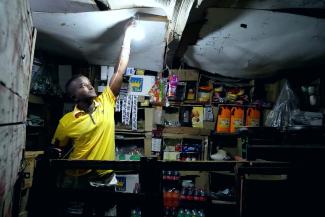According to the World Bank, approximately 35 percent of people in Djibouti do not have access to electricity. The rural village of Kalaf, in Northern Djibouti, is one of the communities that lives without electricity.
The village is also directly affected by climate change, with increasing temperatures that can reach 50 degrees celsius and drought in the summer. In response, USAID partnered with the Ministry of Energy & Natural Resources and startup LiquidStar to bring off-grid energy and potable water to the community.
USAID invested in Liquidstar’s innovative technology to bring a solar charging station to Kalaf village. The station charges 100 watt, 200 watt and 2.5 watt mobile batteries which the community can rent for a small fee of 50 FDJ (28 cents) per day to power their homes and businesses. This helps counter high electricity costs. The project also created jobs in the community by hiring two people to oversee the installation and ensure that the batteries reach the most remote homes, and a young woman, Kadiga Ibrahim Mohamed, to collect contributions from the villagers.
Kadiga is a vibrant 25-year-old woman and mother of two. "I am a double beneficiary of this project," she says with a smile. "I use the mobile batteries to bring electricity to our family home. But also, I collect rent from families and help keep books. In exchange, I receive a monthly stipend from the project, which helps me get by as I'm unemployed".
“The village's only school also benefits from the project, " adds Kadiga, whose 4-year-old daughter attends preschool. "The teacher rents one of the batteries from the station to charge his phone and computer.
This allows him to teach the children during the day. “Before, he had to go far, even to the city of Tadjourah, to charge his electronic devices," she explains.
At home, Kadiga uses one of the cell phone batteries to charge her phone, allow her grandmother to listen to the radio, and power televisions for families that have them to watch local channels. In addition, the rentable batteries come with a lamp which the children of the village gather around to do homework and light their homes in the evening.
Access to energy has revolutionized the village. The only shop in the village is now able to operate at night. The shop uses the rentable battery to light its merchandise and greet customers. The shop is on the main road that connects the village to the region’s largest city, Tadjourah, and cars and buses can now stop to buy products in the evening. With this light, the village of Kalaf is now visible at night, out of the shadows and on the map!

